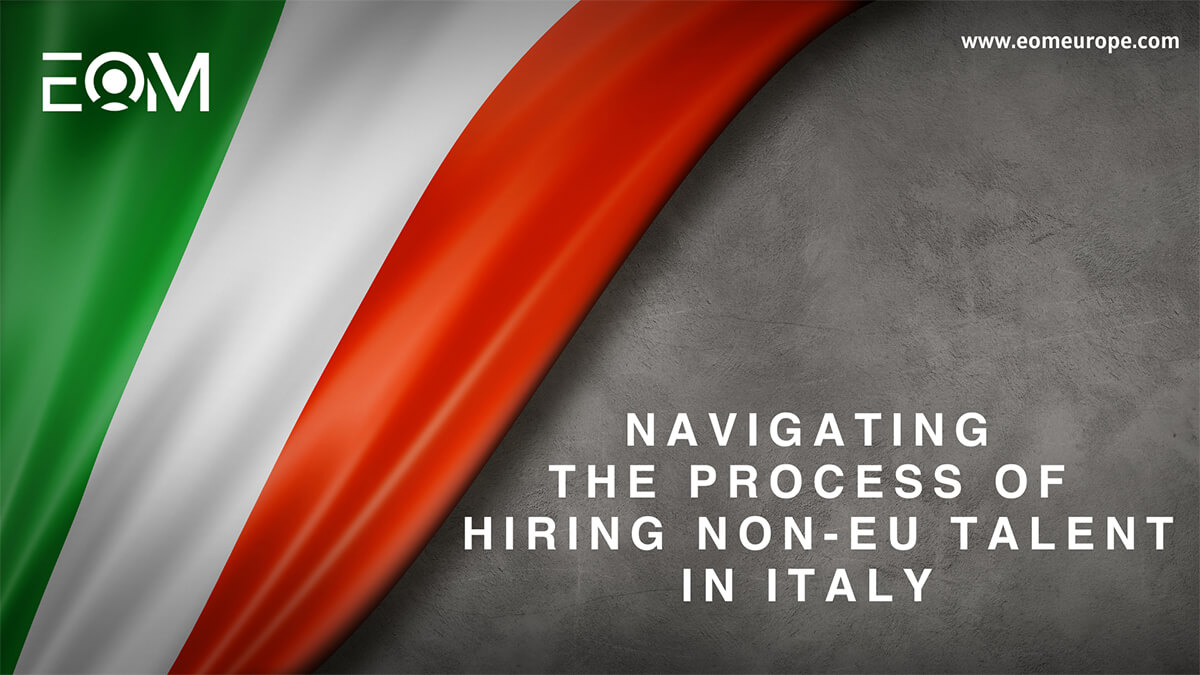Navigating the Process of Hiring Non-EU Talent in Italy 🇮🇹

Navigating the Process of Hiring Non-EU Talent in Italy
Italy is a highly attractive destination for businesses seeking skilled talent, thanks to its rich cultural heritage, robust education system, and strategic location within Europe. The process can be complex for non-European Union (EU) companies looking to hire non-EU talent in Italy due to stringent immigration and labour laws. This article provides a detailed guide on navigating the process of hiring non-EU talent in Italy, including the benefits of using an Employer of Record (EoR) to simplify compliance and administrative tasks.
- Understanding Italian Immigration Laws
📜
Hiring non-EU nationals in Italy involves adhering to specific immigration laws and regulations. Key points to consider include:
- Visa Requirements: Non-EU nationals must obtain a work visa to be legally employed in Italy. The type of visa depends on the nature and duration of the employment. 🛂✈️
- Work Permits: A Nulla Osta (work permit) is required before the employee can apply for a work visa. This permit is issued by the Italian immigration authorities (Sportello Unico per l’Immigrazione). 📄✅
- Residence Permit: Once in Italy, the employee must apply for a residence permit (Permesso di Soggiorno) within eight days of arrival. 🏡📅
- Types of Work Visas 🛂💼
Italy offers several types of work visas for non-EU nationals, each catering to different employment scenarios. Some common types include:
- Long-Stay Visa (D-Visa): For employees who will be working in Italy for more than 90 days. ⏳
- EU Blue Card: For highly skilled workers with a higher education qualification and a job offer with a salary threshold set by the Italian government. 🎓💼
- ICT Permit: For intra-company transferees who are being relocated to an Italian branch of their company. 🌍🏢
- The Hiring Process 🔄📝
Here’s a step-by-step guide to hiring non-EU talent in Italy:
- Job Offer and Contract: Extend a formal job offer to the candidate and prepare an employment contract in compliance with Italian labor laws. 📄✉️
- Application for Nulla Osta: The employer applies for a Nulla Osta at the local immigration office (Sportello Unico per l’Immigrazione). This involves submitting documentation such as the employment contract, proof of the company’s registration, and the candidate’s qualifications. 📑🖋️
- Work Visa Application: Once the Nulla Osta is granted, the candidate applies for a work visa at the Italian consulate or embassy in their home country. 🛂📬
- Entry to Italy: After receiving the visa, the employee can enter Italy and must apply for a residence permit (Permesso di Soggiorno) within eight days. ✈️📅
- Registration with Authorities: The employee must register with the local police station (Questura) and complete any required health insurance and tax registration. 🏢👮♂️
- Employer Obligations 🏢⚖️
Italian labor laws impose several obligations on employers hiring non-EU talent:
- Employment Contracts: Must be in writing and comply with Italian labor laws, covering aspects such as salary, working hours, and job duties. 📜🕒
- Social Security Contributions: Employers must register the employee with the Italian social security system (INPS) and make regular contributions. 💶👥
- Taxation: Employers are responsible for withholding income tax from the employee’s salary and remitting it to the Italian tax authorities. 🧾💰
- Compliance with Labor Laws: Adhere to all Italian labor laws regarding working conditions, health and safety, and employee rights. 🏥🛠️
- Using an Employer of Record (EoR) 🌍📑
An Employer of Record (EoR) can significantly simplify the process of hiring non-EU talent in Italy. Here’s how:
- Compliance Management: An EoR ensures all immigration, labor, and tax laws are fully complied with, minimizing legal risks. ✅⚖️
- Administrative Support: The EoR handles all administrative tasks, including payroll, social security contributions, and tax filings. 📋📊
- Local Expertise: An EoR has in-depth knowledge of Italian labor laws and regulations, providing valuable guidance and support.
💼
- Speed and Efficiency: By managing the complex paperwork and processes, an EoR can expedite the hiring process, allowing the company to onboard talent quickly. ⏩👩💻
- Cost-Effective Solution: Avoids the need for establishing a legal entity in Italy, reducing setup costs and administrative burdens. 💸🏢
- Customized Solutions from EOM Europe 🌍🛠️
For non-European companies and expatriate workers looking to work in Italy, EOM Europe (eomeurope.com) is the best place to find customised solutions tailored to their needs. EOM Europe specialises in providing bespoke EoR services that address the unique challenges of hiring and managing non-EU talent in Italy. Their expert team offers personalised support and ensures seamless integration into the Italian market, making the process smooth and compliant. 🌐🤝
Conclusion
Hiring non-EU talent in Italy involves navigating a complex landscape of immigration laws, work permits, and labour regulations. Understanding these requirements is essential for compliance and successful integration of foreign employees. Partnering with an Employer of Record (EoR) like EOM Europe can streamline the process, providing expertise, compliance assurance, and administrative support. This enables non-EU companies to focus on their core business activities while successfully expanding their workforce in Italy. For tailored solutions that meet the specific needs of expatriate workers and non-European companies, visit eomeurope.com. 🌍💼
#internationalexpansion #eorservices #hiringinitaly #globaltalent #eomeurope


